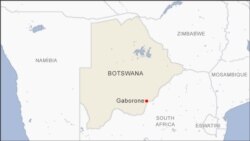A prolonged dry spell in Southern Africa has caused a decline in mopane worms, a key source of income and food for rural communities in Botswana. Experts say over-harvesting of the protein-rich caterpillars has also affected breeding.
Oduetse Keremang ekes out a living harvesting and selling what locals calls “edible diamonds” — mopane worms, a caterpillar and seasonal delicacy in Botswana.
But this year, harvesters like Keremang expect little income, as southern Africa’s prolonged drought means fewer worms, known locally as "phane."
Keramang says the dry spell has killed many mopane worms. But despite the drought, she travels to faraway mopane woodlands to harvest the worm. She says the caterpillars are her way of life, or her children will starve.
The caterpillar is harvested in the woodlands, cooked and then dried.
Mopane worm vendors like Yaone Sekomotso sell their product along the highway.
But there is not much to sell this year, she says.
Sekomotso says without the worm, they survive through selling farm produce like ground nuts and maize.
Botswana’s chief climatologist, Radithupa Radithupa, says while climate change plays a role, it's not the only reason for the decline of the mopane worm.
“First of all, phane was used for just relish. But nowadays, people have grown into the market and are using it for commercial basis. They sell it across the borders," said Radithupa.
In the capital, Gaborone, 50 kilograms (110 pounds) of mopane worms now sell for as much as $220.
Overharvesting has contributed to the caterpillar’s decline, says University of Botswana researcher, Ephias Mugari.
"Another reason is the increased demand for mopane caterpillars not only here locally in Botswana but even beyond the borders, considering that mopane caterpillars are also used for manufacturing livestock feeds. So, there is increased demand," said Mugari.
Since 2013, Botswana has issued permits to regulate the harvesting of the worms.
But locals say better protections are needed for the worm that helps sustain rural livelihoods in southern Africa.














